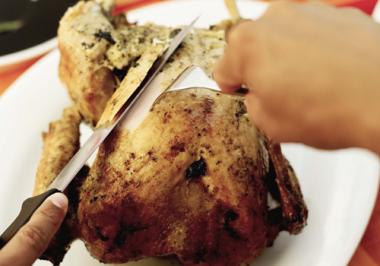Driving back to the office after lunch a few days before Thanksgiving, a fresh bag of organic chicken feed in the back of my truck, I snapped on the radio and tuned into the Thom Hartman Show—for my money, the very best talk show on radio.
Hartman, a brilliant author, historian and progressive commentator, was on vacation. His fill-in hosts were doing a Thanksgiving show, keeping it light, talking about traditions and favorite recipes for the holiday. At some point, the conversation turned to the subject of stuffing a turkey.
I don't stuff turkeys. I had heard many years ago that it isn't a wise practice
Truth is, I've probably only cooked a couple turkeys in my life; the only time I remember doing it, I followed an approach I saw Martha Stewart demonstrate on her show, lifting the skin from the breast and drumsticks and packing the space with garlic butter, to add flavor and keep the meat moist.
I'd been told by many people who are better cooks than I am that stuffing a turkey was a recipe for a) a dry, tough turkey or b) a trip to the emergency room. To get the center of the bird cooked properly—hot enough to kill bacteria—you have to cook a stuffed turkey a lot longer than one that isn't stuffed, thereby overcooking most of the bird.
One of the callers to the Thom Hartman Show elucidated this point, mildly chastising the hosts for even entertaining the notion of stuffing a turkey, but quickly bridging to a long, not entirely unpersuasive rant about the evils of agribusiness and the dubious standards used to delineate truly enlightened farming practices.
The hosts, suitably chastened, quickly enumerated the many recent programs the Thom Hartman Show has done on bad farming practices, on the dangers of GMOs, the role of companies such as Monsanto. Then they reminded listeners that they can, in fact, avoid factory farmed food and still enjoy holiday traditions that include meat by seeking out products from local organic farms.
I'd like to say the show inspired me to do just that, but it didn't. It annoyed me on one level, shamed me on another, and left me feeling, at least temporarily, pretty ambivalent about the whole damn subject.
It was a perfect beginning to a holiday that, for some time now, I've seen as a giant pain in the ass.
*
A Thursday holiday makes lots of sense—if you have Friday off, too.
If you didn't have Friday off last week, you may have spent part of your 2009 Thanksgiving as I did, cursing the United States Office of Personnel Management (USOPM), the federal agency that effectively establishes "national" holidays in conjunction with the United States Congress by determining paid holidays for federal employees.
I've always wondered why they don't move Thanksgiving to a Friday. Or a Monday. Other holidays that fall on weekdays are generally observed on the nearest Monday, the USOPM notes at its website. Not Thanksgiving. We hold onto the traditions of Thanksgiving like grim death: we eat turkey, the Detroit Lions always play the NFL's afternoon game and about half the American labor force heads back to work on Friday with hangovers.
If the whole point of the holiday is to eat, drink and be merry—yeah, yeah, and to be thankful, too—wouldn't having it fall on a three-day weekend help?
As I drove along the MassPike on Thanksgiving Day, headed for my in-laws' house in southeastern Massachusetts, I thought about the meal that lay ahead of me. I'd had it before. Many times.
When my wife and I first got together, my mother-in-law's take on the Thanksgiving feast was just enough different from my mom's to provide, for the first year, maybe two, some sense of novelty. By now, I've become numb to any of the subtle points of differentiation. My mother-in-law's Thanksgiving feast has, in recent years, been passed along to my sister-in-law, who faithfully reproduces it year after year without even accidental deviation.
I have no harsh judgment of the cooks, who have simply responded to the pressures, expectations and limitations of this inconvenient Thursday holiday. Each mother, saddled with the sacred duty of providing a traditional holiday feast comprising many dishes, none complicated on its own but each part of a logistically grueling whole, has employed all available time and technique to get the job done. Having mastered it once, she finds no obvious merit in further innovation.
In a nutshell, that for me is all that's wrong with holidays like Thanksgiving. In our urgency to hold to tradition, we bind ourselves to a past that wasn't quite as tasty as we remember it.
In my imagination there are perfect holidays, filled with feast and festivals, attended by everyone in Whoville. At my ideal Thanksgiving table, the featured entr?e are birds—ruffed grouse, woodcock, pheasant—that I harvested myself from woods and fields still teeming with game (as I say, this is my ideal world). The meal itself would take days to prepare, with all the family's many hands involved in its preparation. No worries about making a living: this is Thanksgiving, so important a tradition that no company would dare to ask its employees to work during the week in which it falls.
At my somewhat less sentimentalized Thanksgiving, the featured entr?e is, at the very least, the product of a local farm, obtained as a family ritual, not unlike our annual trip to fetch a Christmas tree. Better yet, it's a bird from my farm, where I know the practices are enlightened and holistic. The meal might not take days to prepare, but it is conceived and executed in a leisurely way, a way that can make cooking a celebration rather than a chore.
But I'm not in my ideal world as I stop, halfway to grandmother's house, to buy $38 worth of gasoline—enough for the round trip and not much more. We'll get there a bit before noon and be back on the road six hours or so later, after consuming a factory-farmed turkey—tasty enough, but that's not the point, is it?—prepared by people who have come to view the meal as an obligation rather than an option.
*
Maybe next year we should insist on having Thanksgiving at our house, I tell my wife as we ease along the Mass Pike, bumper to bumper with thousands of other people heading home from their own festivities.
My wife remains silent. I'm not sure if she's suffering from the narcotic effects of turkey or is just sick of my whining.
Maybe next year we should go to the Blue Heron, or to one of the other wonderful restaurants in the Valley that offer, at a fixed price, delicious, often adventurous holiday fare, I suggest.
Silence.
If we are going to have to go to the in-laws' next year, maybe we should offer to bring the turkey—not a Butterball, but a locally raised, organic bird.
Silence.
Finally I ask her why she's giving me the silent treatment.
"Uh, what? Sorry, honey," she says, frowning. "I was thinking about something."
"Thinking about what?"
"You don't want to know," she said, with a heavy sigh.
I assured her that I did.
"I was just thinking," she said testily, "about Christmas."



